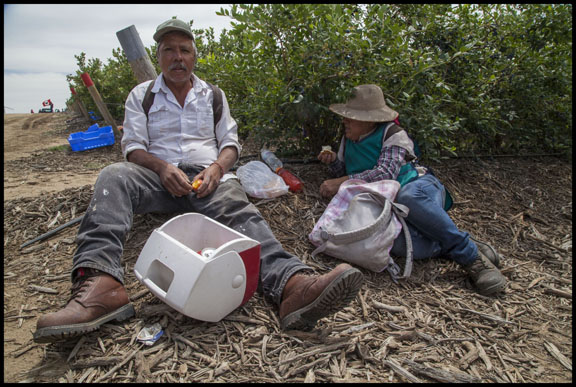by David Bacon
Chapulines are small insects, like grasshoppers. When they’re toasted with lime and garlic, they’re a delicacy that’s as much a part of Oaxacan indigenous culture as mezcal or big tlayuda tortillas.
One worker standing in line in the edge of a San Joaquin Valley blueberry field laughed at the name. “We’re very humble, like chapulines, and there are a lot of us, like we’re all piled up together on a plate.” Another reason he liked the similarity was the color – a plate of chapulines is reddish brown. Pointing down the line of workers, he gestured: “Look at all the tee-shirts.”
Hundreds of workers had lined up in two long rows in the pre-dawn darkness, ready to vote in a union election last Saturday morning. So many were wearing red tee-shirts emblazoned with the black eagle of the United Farm Workers that the few people without them stood out conspicuously.
As the sun came up, the lines slowly moved toward the ballot boxes, and workers began to vote.
By 11 a.m. it was over. Blueberry pickers in their red t-shirts poured out of the rows of bushes, and then gathered in a semicircle to watch an agent of the Agricultural Labor Relations Board make the count.
As he announced it, 347 to 68 in favor of the union, the cheering started.
The chapulines had won.
Workers may make jokes about their indigenous identity, but a far less pleasant reality led to their decision to organize a union.
“The majority of the people here are from Oaxaca – Mixtecos and Zapotecos,” explains Paulino Morelos, who comes from Putla. Like many of the 165,000 indigenous Mexican migrants in California fields, a large proportion don’t speak Spanish well.
“The foreman humiliates them,” he says. “He makes fun of them and says they work like turtles. Even if someone is slow, we’re working on piece rate, not by the hour, so you only get paid for the work you do. But he’s always pushing them to work faster. Carmela, another foreman, says Oaxacos are no good.” “Oaxaco” and “Oaxaquito” are derogatory terms for indigenous people from Oaxaca, which Morelos says he hears a lot.
Conflict about the piece rate led to a workers’ rebellion. At the beginning of the blueberry picking season in April, the company was paying pickers 95¢ per pound. By mid-May, the price had dropped to 70¢, and then 65¢. Finally, on Monday, May 16, the company announced it was dropping it again, to 60¢. Workers refused to go in to pick, and called on the company to change its decision.
The farm’s owner, the Klein Management Company, produces clamshell boxes of blueberries sold under the Gourmet Trading Company label. Like most large California growers, it does not employ workers directly. Instead, it uses a labor contractor, Rigoberto Solorio.
In a dramatic confrontation filmed by workers on their cellphones, Solorio told a crowd at the edge of the field, “What I can say is this, boys. We cannot raise the price. We gave the price we could. We’re not going to raise it. If you want to stay, stay.” He was then interrupted by shouts of “Vámonos!” – “Let’s go!”
In another crew, Morelos says, “Carmela told us, ‘If you don’t want to work, get out.’ I saw cars leaving the field, so I told her, ‘We’re leaving too.’ One foreman said, ‘You can take the people out, but don’t come back.’ We left anyway.”
The strike was on.
Strikers went to the local UFW office, and the following morning, union organizers met with the workers as they all gathered at the edge of the field. A group then went to the offices of the Agricultural Labor Relations Board, which administers California’s farm labor law. They asked for a union representation election within 48 hours, which the law provides during strikes.
Due to lack we were not able to publish the complete story. To read please the rest, please visit: http://davidbaconrealitycheck.blogspot.com/2016/05/the-revolt-of-chapulines.html.



